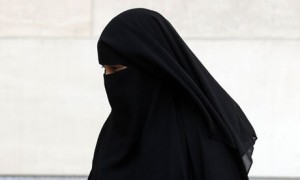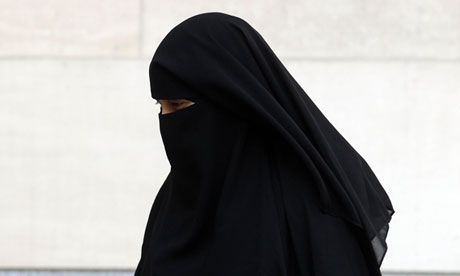 Judge Peter Murphy made the ruling in the case of Muslim convert Rebekah Dawson, who is facing trial for allegedly intimidating a witness. The 22-year-old had claimed her religious beliefs dictated that no male other than her husband could see her face. Lawyers for the defendant had argued that forcing the 22-year-old convert to remove her niqab in court would be a breach of her rights under Article 9 of the European Convention of Human Rights. But in a lengthy ruling, Judge Murphy said it was of “cardinal importance” to the adversarial system that a jury could see a defendant’s face while giving evidence. The issue first arose when Mrs Dawson refused to lift her veil in order to identify herself at a plea and case management hearing at Blackfriars Crown Court. The case was adjourned until last week when a compromise was reached and the judge allowed a female police officer to identify her in the privacy of a side room.
Judge Peter Murphy made the ruling in the case of Muslim convert Rebekah Dawson, who is facing trial for allegedly intimidating a witness. The 22-year-old had claimed her religious beliefs dictated that no male other than her husband could see her face. Lawyers for the defendant had argued that forcing the 22-year-old convert to remove her niqab in court would be a breach of her rights under Article 9 of the European Convention of Human Rights. But in a lengthy ruling, Judge Murphy said it was of “cardinal importance” to the adversarial system that a jury could see a defendant’s face while giving evidence. The issue first arose when Mrs Dawson refused to lift her veil in order to identify herself at a plea and case management hearing at Blackfriars Crown Court. The case was adjourned until last week when a compromise was reached and the judge allowed a female police officer to identify her in the privacy of a side room.
During his ruling, the judge revealed that Mrs Dawson, who was referred to as D, had only worn the veil since May 2012. But he said his decision would have been the same if she had worn it for years accepting that her feelings on the issue were sincere.
He went on: “I accept for the purposes of this judgment that D sincerely takes the view that as a Muslim woman, she is either not permitted or chooses not to uncover her face in the presence of men who are not members of her close family. I have been given no reason to doubt the sincerity of her belief.”
But in a lengthy ruling handed down today Judge Murphy said the ability for a jury to see a defendant’s demeanour during cross-examination was a principle part of the adversarial trial system. He said while the defendant would have to remove her niqab while giving evidence, screens could be erected or video links used to ensure she was only visible to the judge, the jury and counsel. He also ruled that court artists would not be permitted to sketch the defendant when her veil was removed. “No tradition or practice, whether religious or otherwise, can claim to occupy such a privileged position that the rule of law, open justice and the adversarial trial process are sacrificed to accommodate it. That is not a discrimination against religion; it is a matter of upholding the rule of law in a democratic society.”
Solicitors for Mrs Dawson have said they are considering their position but it is possible they could ask for a judicial review of the ruling.






